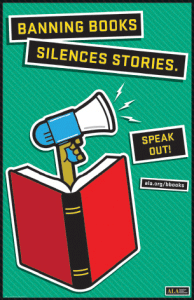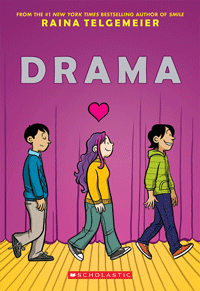Banned Books Week: Censorship limits readers’ freedom
September 27, 2018
 “Banning books silences stories” is the slogan for this years Banned Books Week. From Sept. 23-29, the American Library Association and Amnesty International invite everyone to celebrate the First Amendment by participating in the week-long event to shine light on literary censorship in the United States.
“Banning books silences stories” is the slogan for this years Banned Books Week. From Sept. 23-29, the American Library Association and Amnesty International invite everyone to celebrate the First Amendment by participating in the week-long event to shine light on literary censorship in the United States.
Restricting the public from reading certain content is not a new occurrence. One of the first instances of this violation dates back to 399 B.C. when Socrates was said to have had corrupted the minds of the youth. With the invention of the printing press in the 1450s, censorship only grew even more now that the improved technology was able to produce mass publications. During the English ruler, Henry VII’s, reign in the 1500s, laws were set in place to control the production of texts.
Similar laws more recently were discussed in the United States wiyh the Island Trees vs. Pico case in 1982. The supreme court couldn’t come to a conclusion after voting four for and four against local school boards taking books out of school libraries. The case analyzed 11 books, all of which had been challenged by the school board who suggested that they were, “anti-American, anti-Christian, anti-Semitic, and just plain filthy.” The books included “Slaughterhouse Five, “Best Short Stories of Negro Writers” and “Go Ask Alice”.
Although the Island Trees vs. Pico case was not able to reach a majority agreement, they did end up coming to a mutual consensus. School boards, administration, and officials did not have the right to get rid of books due to their own personal distaste towards such works. However, if the content was classified as legally obscene, they did have the right to expel it from libraries.
Most current attempts to ban books are started by parents of students who see the texts as having explicit sexuality, vulgar language, and inappropriate subject matters for minors. After deciding that they dislike the book, the parents are able to relay their concern to the librarians who are then supposed to report the complaint.
According to American Libraries, 11,300 book have been challenged since 1982. If, after further review, a book is successfully challenged and becomes banned, it can be restricted locally or nationally.
The American Library Association Office for Intellectual Freedom listed the following in order as the top ten books banned for 2017: “13 Reasons Why”, “The Absolutely True Diary of a Part-Time Indian”, “Drama”, “Kite Runner”, “George”, “Sex is a funny word”, “To Kill a Mockingbird”, “The Hate U Give”, “And Tango Makes Three”, and “I Am Jazz”.
As years pass, the opinion of appropriateness of sources evolves due to the ever-changing perspectives of society. The censorship of materials for young people has been controversial from the beginning of time and with new books being banned each year, the issue doesn’t seem to be growing any less debatable.

